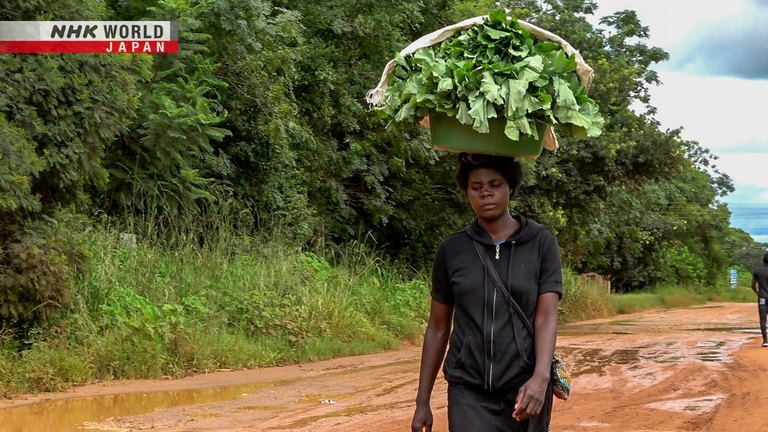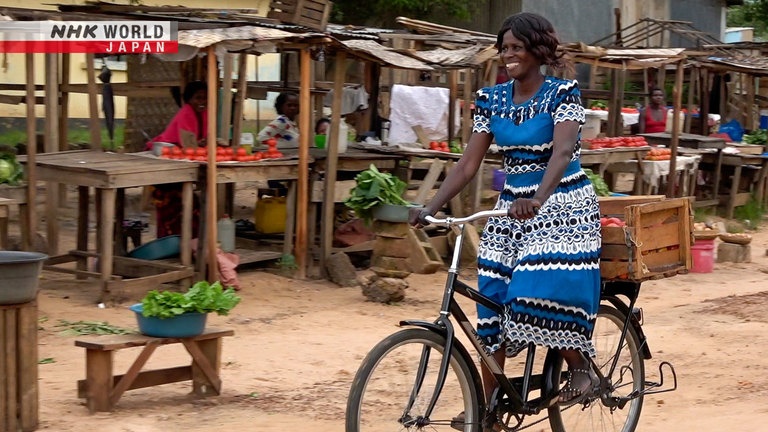Hope Just a Bike Ride Away: Wyson Lungu / Social Entrepreneur
In Zambia, a country where many live in farming villages without access to paved roads, Wyson Lungu has sold over 3,000 bicycles to residents through a deferred payment system, helping them earn more.




Transcript
Direct Talk
In Africa's Republic of Zambia,
over 80% of the population
resides in farming regions
outside the range of public transit.
The constant need to walk long distances
is one of the factors
condemning many residents to poverty.
Wyson Lungu
runs a business
providing locals with bicycles,
with which he seeks to bring
a major change to the society
of farming in the country.
Owning a bike should be a human right
because it enables you to move
from one point to the other.
How can you have freedom of expression
but you do not have freedom of movement.
You know? So these are some of the things
which are very, very, very important.
Many people have purchased bikes
from him to haul crops,
successfully tripling their earnings.
Lungu is known in the villages
as a life changer.
In this episode,
we learn how his bicycle business
is providing new mobility
to Zambian farming communities.
Hope Just a Bike Ride Away
Lusaka, the capital of Zambia.
Lusaka
This is where Lungu runs
his bicycle sales company.
Good morning.
How are you?
Good to see you.
Happy New Year.
Since establishing the company in 2018,
he has sold over 3,000 bicycles
to farming villages.
After studying international business
and marketing in America,
Lungu returned to Zambia to begin working
at a major telecommunications company.
As for what lead him to focus
a business on farming villages,
he recalls an experience he had
during a business trip seven years ago.
One time in 2016,
I went to one of the
most remote parts of the country.
And whilst passing through the valley,
the valley, the terrain is
very, very unfriendly.
So I had my
four by four's car tires blow out.
All four of them.
And just to get help,
we had to wait almost 16 hours
until we saw somebody on a bicycle
who was ferrying a patient to a local hospital.
I had to flag him and ask him to say,
"Listen, could you be able to help us,
to take us somewhere we can make a phone call
so we can ask for help."
So he says
"I can only do that once I take this person."
So it took another eight hours
for him to come back.
And then I realized,
"Wow."
"Mobility is a challenge."
After waiting a full 24 hours,
the bicyclist finally returned
to assist Lungu,
and transported him
to the village where he lived.
I asked that person to say
"Who's the owner of the bicycle?"
He told me it was the grandfather.
And the grandfather only allowed him
to ride that bicycle
because he was taking
a patient to the hospital.
That's how important
that bike is in the village.
It can be a life-and-death situation.
And I was like,
"Wow."
"Let me see how I can bridge the gap
between the Haves and the Have Nots."
Instead of me working for
big corporate organizations,
let me start something that
I can be able to help ordinary people."
Lungu's primary sales locations
are farming villages
hundreds of kilometers from Lusaka.
It's rare for city dwellers
to make trips to the small villages.
Along the roads near the villages
are locals selling goods
like fruit and charcoal.
They come from
10-15km inside these villages.
So now imagine that
they don't have a bicycle,
how do they bring
for instance, this charcoal
to the road sides.
This charcoal here.
You see the charcoal.
How do they bring it here?
These are basically women farmers.
So these women farmers
involve themselves
in different farming activities.
They live 30 kilometers away from the farm
and they wake up 03 in the morning
to report for work at 7:00 hour.
Can you imagine?
By the time you get to work, you are tired.
Then, you work for eight hours.
Then, you know,
you have to walk another four hours home.
I mean, who does that
in this 21st century.
Lungu loads a large truck with bicycles
from his storehouse in Lusaka
to carry to the farming regions.
This woman had walked
four hours each day to the tomato fields.
After purchasing a bicycle
from Lungu 6 months ago,
she gained the ability to quickly
haul large loads of tomatoes to market,
more than tripling her income.
My life have changed really big,
because I built that house there,
you can see, it's there.
Through that bicycle,
I built the house,
is here.
It's not yet finished.
I have cried with the people
that I have helped
because they tell me,
"You don't know what you've done.
You've just saved my life."
When you provide
an opportunity for somebody
to look after their family,
when you provide
an opportunity to somebody
who had no dream at all.
But because you provide them something
that now has unlocked potential,
it's so amazing.
When he began the business,
Lungu became aware that
there were many people
who simply couldn't afford to pay for a bicycle.
The farmers possessed
very limited cash income.
In response, Lungu introduced
a pay-as-you-go system.
It allowed for split payments
spanning up to two years.
For people who lacked even those funds,
Lungu agreed to a barter system
with crops or livestock.
We also learned very quickly
by understanding that
income in the rural areas is very seasonal.
So what we've done now is that
we're doing barter system.
Can you imagine somebody in the rural areas,
they only have maize as money.
Because for them
to convert that maize into cash,
it's a long process.
We'll give you a bicycle,
but the repayment,
we do not need the money
because we know it's seasonal.
You can give us
the commodities that you grow.
If you keep animals, say goats,
cattle, sheep, chickens,
we will take those
as a payment for the bicycle.
It has worked properly.
When we get those commodities,
we take those,
we have off-takers to whom we sell,
and we still get the cash.
To implement the pay-as-you-go system,
Lungu forms associations
with the village councils,
allowing them to act
as retailers for his business.
The association observes
the living conditions
and payment ability of prospective buyers
to determine who should pay in cash,
and who is eligible for the barter system,
for a business model
that considers the needs of locals.
We do not provide
our pay-as-you-go scheme to individuals.
That individual has to
belong to an association.
And the reason for it is that
we want to ring fence risk
around repayment.
So, before we even provide them those things
we have a minimum of
at least two or three workshops.
The idea is to understand
what their needs are.
Bicycle purchases come equipped with
guarantees of free maintenance and repair.
Maintenance stations
are located in each village.
The buyers can drop by
at any time for a tune-up.
Looking at the people that we deal with,
these are people that
do not have enough money.
So that they don't have to worry
that they're going to spend
extra money on repairing the bike.
Second is to make sure that the money that
they saved from the repairs of the bicycle,
they can use it for other purposes.
If we were not offering free repairs,
I can guarantee you that
60 percent of the customers,
when a bicycle has a problem,
they will not fix it.
It's like health care.
If healthcare is free,
people are inclined to come
and seek medical help.
Rather than optimize profit,
Lungu wants to best attend
to the needs of villagers.
However, Lungu reiterates that
it's a business all the same.
And by the way, we are not a charity.
We do not give bicycles for free.
We believe that
whenever you give free things to people,
they do not look after them.
They do not care.
We want people to pay for something
which is affordable,
use it responsibly,
and be accountable for things which
they know that are good for their household
and for humanity as well.
So this is very, very, very important for us.
In the farming villages of Zambia,
many women are responsible
for parenting and housework
in addition to their work on the farm.
Lungu has taken notice of these women.
He hopes that by providing them
with greater economic opportunities,
he can change rural Zambian society
for the better.
When you look at a woman,
she is the driver
of social and economic power
at the household level,
at the community level.
You can see now
more and more women are stepping up.
They are the people making a difference.
So even if you look at how things are done,
women are more trustworthy and more truthful.
You have now more and more women
coming into the limelight.
And they are more believable
because they speak
from a point of experience.
Lungu is in the process
of expanding his business
in order to provide new employment
opportunities for women.
He's recruited people to travel
to Lusaka from their farming villages
for a two-week training session
in bicycle repair.
Having acquired these skills,
they become eligible to work
making repairs at their village stations.
Why do we do that?
We also want to create a value chain.
She's able to provide
free repairs of the bicycle.
We create a relationship.
So they're able to engage with that person,
understand how they can be able
to maintain their bicycle,
and those that want to
also come on the program,
they are able now to be signed out
by that particular person we have hired.
So that's a local person.
Now, if the demand is growing,
we do not only need one person.
We start now employing, two, three, or four.
So that's how we create this value,
and now at scale, we are able to
transform an entire community.
In expanding his business,
Lungu has a particular reason for focusing on
the potential and diligence of local women.
As a child, he had a strong role model.
So for me, this has a very personal code,
especially when I talk about my mother.
Because of perseverant
and hard work and discipline,
we were able to pull it through,
but because of the help of my mother.
That's why for me,
I've taken the conscious decision
that my business,
I'll focus 99% on women.
Lungu's work in providing bicycles
to improve life in farming communities
has earned him attention
from both within Zambia and abroad.
People call him a life changer.
In the future,
he hopes to expand his work
across the entire Republic of Zambia.
Zambia is a mining country.
We are the second largest producer of copper.
But one day copper will finish.
But something which is
sustainable is agriculture.
Us dealing with farmers,
we also want to build capacity
so that we can have more farmers
who grow more food
and then we're able to feed the country,
other than feeding the country,
whatever is in excess, surplus,
we can be able to export it
to other neighboring countries.
Mind you, Zambia is land linked.
We have seven neighbors surrounding us.
So if we grow enough food,
we can be able to export
and this means more money
into the pockets of farmers.
Wyson Lungu left us with a statement
of the vision he holds for his work.
Many people in the world need hope
and drive to live a decent life.
The bicycles we give to the poor and women
provide transforming change.
This changes the world and lives.
My passion is to see poor people smile.